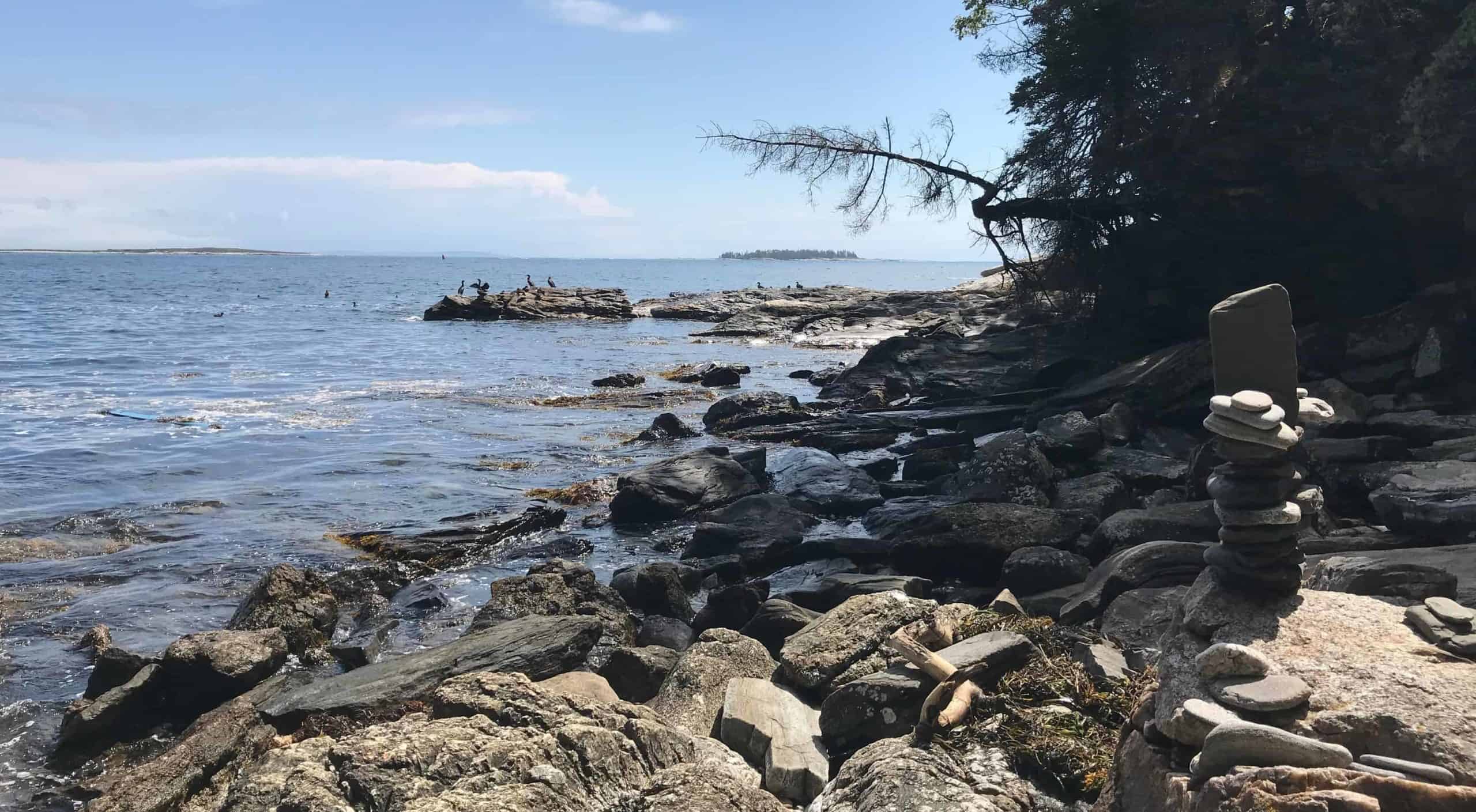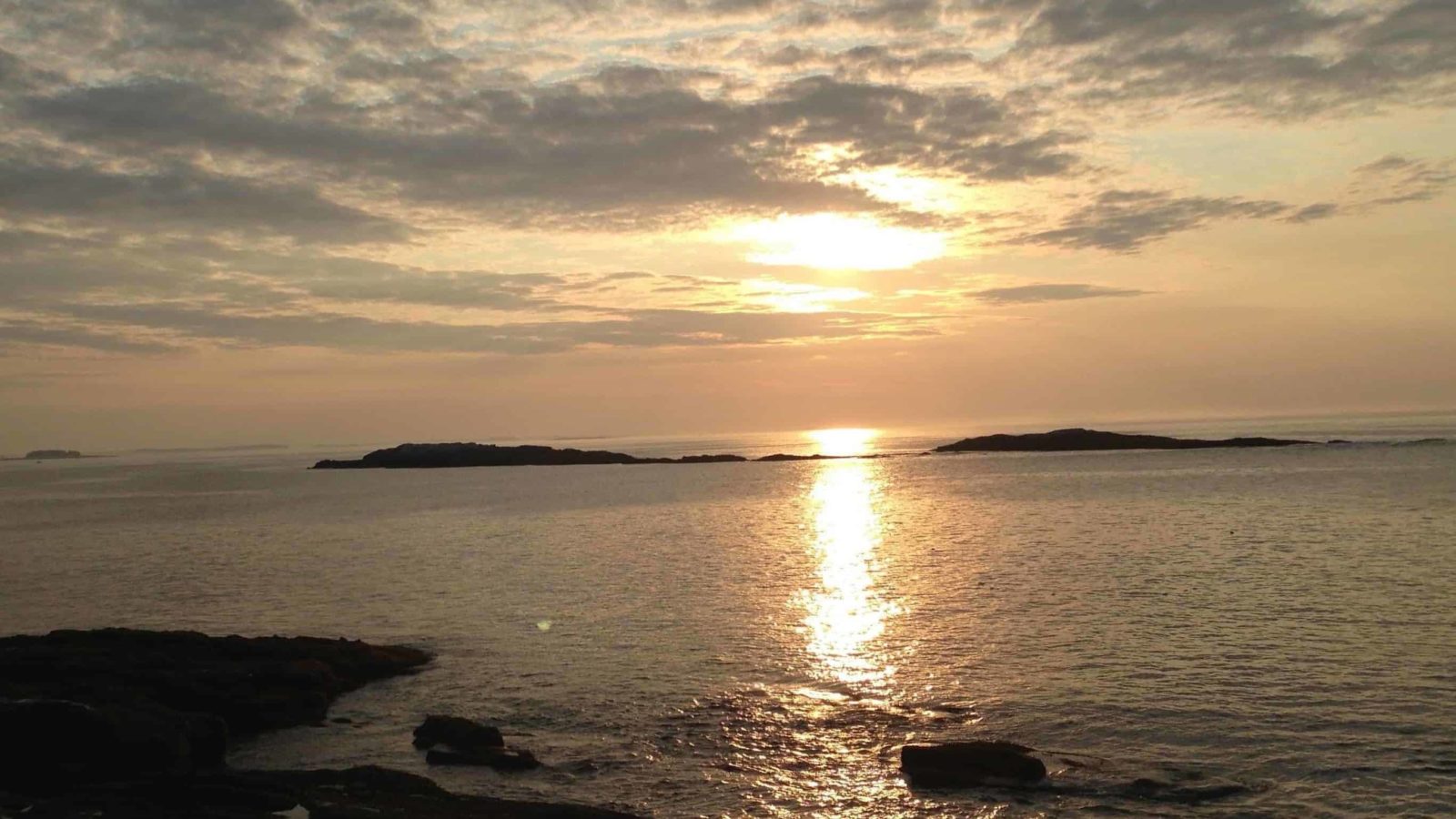Fifty-three people of the Mendi from Sierra Leone captured a slave ship. Each one of them had been kidnapped from a rice field or a house where he slept beside his wife. They crossed the ocean from Africa in a hold compartment three feet high — jammed sitting front to back, swollen with thirst, sick and without light.
‘Force
found me in my village,
or in sleep, walking the low
lovely huts, my children’s voices …’
In a novel-length tribute of poems, Kevin Young tells their stories. They were sold in Cuba illegally. International slave trade was forbidden in Cuba by 1839. And in Caribbean waters, they won free.
In the Berkshires on a sunny aftrnoon he read from “Ardency” and other new work at The Mount, as the Amy Clampitt writers residency program held its reading series under Edith Wharton’s eye.

Cormerants gather on the Maine coast at the La Verna nature preserve.
Ann Close, a senior editor at Knopf who serves on the board of directors of the Amy Clampitt program, suggested Kevin Young for this summer’s reading. He is an active writer, she said — a major and rising poet. Young’s “Jellyroll: A Blues” was a finalist for the National Book Award.
“I think Wharton would have been very impressed with his experimentalism,” agreed Susan Wissler, executive director at The Mount: Wharton, who walked through souks in Morocco, loved poetry and read it with a sense of adventure, she said.
“Ardency” begins with a music the blues sprang from: spirituals, field song, African call and response.
‘… one day we took
the wheel from men with eyes of
water we turned the ship towards
the rising sun let the wind grace
our backs …’ — Kevin Young
Once the Mendi captured the Amistad — a slave ship named “friendship” — they tried to sail her east, back to Sierra Leone. But the crew re-routed by night, and the ship grounded in Connecticut. The Mendi landed in jail while a white court debated their future. Abolitionists taught them English, and they kept up their fight to return home.
More than 20 years ago, Young discovered transcripts of the letters they wrote.
“They struck me as so bold,” he said.
They wrote to the president, John Tyler, and to former president John Quincy Adams. Adams argued for them before the Supreme Court. And all the things they could not say, writing from jail in a new language, moved Young. Theirs was emblematic of a broader position, he said. Their story asks forcefully who can speak for themselves —
and who speaks for others.
“He is re-examining black history and culture, viewed from where we are now,” Close said. “Admiring, embracing and coming to terms with it. His project is immense. He worked on ‘Ardency’ for a long time to get the voice. He grew into it; he didn’t do it until he thought he could take on the subject.”
The Amistad has been visited in poetry before, but the Mendi people have not spoken.
Young wants to tell the stories that one-sided histories have not told. The Amistad has been visited in poetry before, he said, but the Mendi people have not spoken. What would it be like to be a farmer, to be stolen, to be forced halfway across the world and have to kill for freedom?
The poems begin in the complete strangeness and dislocation of the ship’s hold, the open sea and the Connecticut winter. As the men learn English, the language of their poems changes to reflect their growing understanding of the people they write to.
Their efforts felt familiar to Young. Poetry is a second language, he said, and their experience is a reflection of a larger African-American experience: Many voices, speaking with many accents, come together to tell similar stories.
So he began with an imaginative form of research, not in archives — those came later — but through an inner examination which he found just as important.
He began with an imaginative form of research, not in archives, but through an inner examination.
He followed the Amistad stories that haunted him. One man, Foone, crossed the Atlantic to drown in a pond in New Haven. Some witnesses believed Foon had let himself sink on purpose, because he was a strong swimmer.
“He couldn’t see the other side of the water,” Young said.
Cinque, who led the attack on the ship, narrates one full section of Young’s book. Young calls it a libretto, implying words over music.
He blends a modern sound and an old sound, and the poems make reference to many musical styles, from spirituals — Go down Moses — to a John-Henry-style folk ballad turned inside-out so that the hero beats the sharks and lives.
He blends a modern sound and an old sound, and the poems make reference to many musical styles, from spirituals to a folk ballad turned inside-out.
The Amistad rebels write their own ironic re-settings of minstrel tunes and Catholic masses. The poems are not often set within their lives in Sierra Leone, as rice planters and husbands and sons — or as the warriors who overcame their kidnappers and held the ship. They are most often written within a New England Christian frame.
Why do the Mendi use the Protestant and Catholic words and forms of worship — credo, sanctus, introit?
“I think they really were converted,” Young said.
The words become theirs. But they do not accept the beliefs without argument. They point out, he said, Christianity’s radical ways of declaring freedom. They use a strange language to get through to the strange people who have tortured them. And under all the words and music they feel their native earth.
‘I who have boiled
and fried, who have fed my family
with blesséd grain brought from the mouths
of gods I bent to also …’

